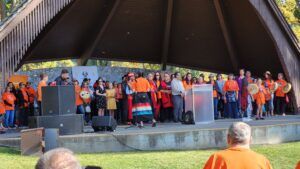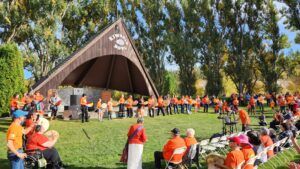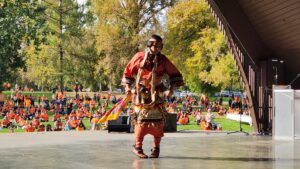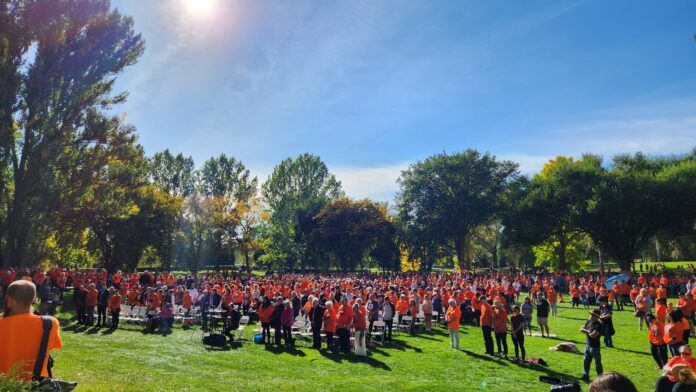Today is the National Day of Truth and Reconciliation.
The thousand or more people that created a sea of orange at the Lheidli T’enneh Memorial park went through the full range of emotion over the course of this afternoon.
“I think it is a day to reflect” Joshua Seymour, a Lheidli T’enneh Councilor told My PG Now, mentioning residential schools specifically.
“This really came to light after the 215 unmarked graves were located in Kamloops. That really shook our country and our values, because that is not what Canada is about.”
During the event at the park today, speakers suggested that number could be up to 10,000 once every former residential school site is investigated.

“This is a piece of our history, that, although it is dark, is a part of our history,” said Seymour. “I think the best way to observe Truth and Reconciliation would be to reflect on yourself on the best way to honour those children who didn’t survive those residential schools, and how to honour the people that did survive and are still with us today.”
Lots of the event was centered around education.
Lheidli T’enneh Elder Clifford Quaw, who was a resident of the Lejac residential school for 11 years, spoke for 20 minutes about his experience before, during, and after being taken to the school.
He said there are four words that come to mind when he thinks of his time in the residential school: “don’t ask. Don’t tell.”

He said that he, and many other survivors were taught “‘don’t ask for help. Don’t ask anybody to help your suffering, in any shape, way or form. Don’t tell nobody about how you suffered. Don’t tell them how you were abused, mentally, physically.’ So we buried it.”
This went for the children, as well as some of the older students who were told to dig the unmarked graves.
“One of those students probably asked ‘why? We just buried four children, those children should have been brought back to their community, to be buried properly!’ And the priest would answer ‘if you do tell, you’re going to be next.’ That was part of the residential

school system that I attended. That I overcame.”
The afternoon also saw musical performances from Kim Gouchie, traditional dance, a drum line, and more speeches and testimony from survivors of residential schools, and descendants.
Tonight at the House of Ancestors, there will be a gathering of people who survived residential schools, and descendants of people who were in the schools.
Seymour also said “it is good to understand the history. It feels like 100 years ago, but it was really only 40 or 50 years ago that these schools were running.”
Here is a link to the 94 calls to action.
Something going on in the Prince George area you think people should know about?
Send us a news tip by emailing [email protected].






